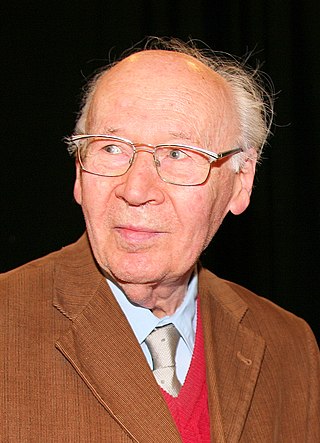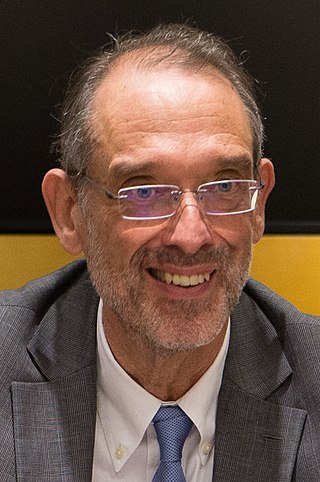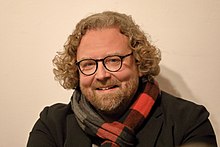
Baron Carl von Rokitansky was an Austrian Empire physician, pathologist, humanist philosopher and liberal politician, founder of the Viennese School of Medicine of the 19th century. Founder of science-based diagnostics.
Robert Freiherr von Heine-Geldern, known after 1919 as Robert Heine-Geldern, was a noted Austrian ethnologist, ancient historian, and archaeologist, and a grandnephew of poet Heinrich Heine.

Franz Serafin Exner was an Austrian physicist.

Ingo Zechner is a philosopher and historian. He is the Director of the Ludwig Boltzmann Institute for Digital History (LBIDH) in Vienna.
Georg Carl Stetter was an Austrian-German nuclear physicist. Stetter was Director of the Second Physics Institute of the University of Vienna. He was a principal member of the German nuclear energy project, also known as the Uranium Club. In the latter years of World War II, he was also the Director of the Institute for Neutron Research. After the war, he was dismissed from his university positions, and he then became involved in dust protection research. After his dismissal was overturned, he became Director of the First Physics Institute of the University of Vienna, and he began research on aerosols. In 1962, Stetter became a full Member of the Austrian Academy of Sciences. In that same year, the Academy established their Commission for Clean Air, and Stetter served as its chairman until 1985.
The Vienna Wiesenthal Institute for Holocaust Studies (VWI) is a research centre dedicated to the research and documentation of and education on all aspects of antisemitism, racism and the Holocaust, including its emergence and aftermath. It was designed by Simon Wiesenthal as well as international and Austrian researchers. The institute is located in Vienna, Austria. It is financed by the City of Vienna and the Austrian Federal Ministry of Education, Science and Research.

Friedrich Stadler is an Austrian historian and philosopher and professor for history and philosophy of science at the University of Vienna. He is the founder and long-time director of the Institute Vienna Circle, which was established as a Department of the Faculty of Philosophy and Education of the Vienna University in May 2011. Currently he is a permanent fellow of this department and serves at the same time as the Director of the co-operating Vienna Circle Society, which is the continuation of the former Institute Vienna Circle as an extra-university institution.
The Department of Contemporary History of the University of Vienna is a scientific institution for the study of contemporary history. The headquarters of the institute is on the campus of the University of Vienna in the Alsergrund district of Vienna. It has about 30 scientific members, about half of them on the staff of the University of Vienna and the other half Privatdozenten who are assigned to the institute. The institute is run as a member of the association of the Vienna Wiesenthal Institute for Holocaust Studies.
The Central Agency for Jewish Emigration in Vienna was a Sicherheitsdienst agency established in August 1938 to accelerate the forced emigration of the Austrian Jews and to organize and carry out their deportation. The resolution of emigration issues relating to Austrian citizenship, foreign citizens’ rights, foreign currencies and the taxation of assets were coordinated in order to accelerate this emigration process. The Central Agency for Jewish Emigration in Vienna was the only institution empowered with the issuance of exit permits for Jews in Austria from the time of the Anschluss in 1938 until the ban on Jewish emigration in 1941. The Vienna Agency became the prototype for similar SS agencies used to implement the deportation of Jews in Amsterdam, Prague and many other European cities.

Jonny Moser was an Austrian historian of the Holocaust and a survivor of the Holocaust.
Florian Wenninger is an Austrian historian, dedicating himself mainly to the history of totalitarian regimes in the 20th century.

Richard Gisser is an Austrian demographer who held leading positions at his country's statistical office until his retirement. He was also the long-time director, then deputy director, of the Vienna Institute of Demography at the Austrian Academy of Sciences.
The Haitinger Prize of the Austrian Academy of Sciences was founded in 1904 by the chemist and factory director, Ludwig Camillo Haitinger (1860–1945), who created the award in honor of his father, Karl Ludwig Haitinger. From 1905 to 1943 it was awarded every year, for "studies in chemistry and physics that proved to be of great practical use for industrial applications". The prize was awarded for the last time in the year 1954.

Heinz Faßmann is an Austrian politician and professor of human geography and land-use planning at the University of Vienna. He served as the Minister of Education in the Second Kurz cabinet in the government of Chancellor Sebastian Kurz and the Schallenberg government of Chancellor Alexander Schallenberg. He previously served in the same capacity from December 2017 to June 2019: he was succeeded in the post by Martin Polaschek in December 2021. Faßmann is considered to be aligned with the Austrian People's Party (ÖVP) but holds no formal party membership or affiliation.
Uwe Harten is a German musicologist, who works in Austria.
Andre Gingrich is an Austrian ethnologist and anthropologist, member of the Austrian Academy of Sciences, director of the Institute for Social Anthropology of the Austrian Academy of Sciences, and retired professor at the University of Vienna.
Alexander Rausch is an Austrian musicologist.
Hans Hirsch was an Austrian academic who worked between 1903 and 1914 on the vast "Monumenta Germaniae Historica" sources project, and subsequently became a full-time professional historian. He accepted an ordinary (full) professorship in history at the German University in Prague as the war ended, transferring in 1926 to the University of Vienna. The focus of his research and teaching was on medieval history. In parallel he built for himself a reputation as a specialist on the "Sudeten Germans", which marked him out as a more than averagely politicised historian. His application for party membership was still outstanding at the time of his death, however.

Michael John is an Austrian historian and exhibitions-curator, internationally known for his research on European and Jewish migration, and on Nazism.

Heinrich Srbik was an Austrian historian who became involved on the fringes of politics before and during the Hitler years.









